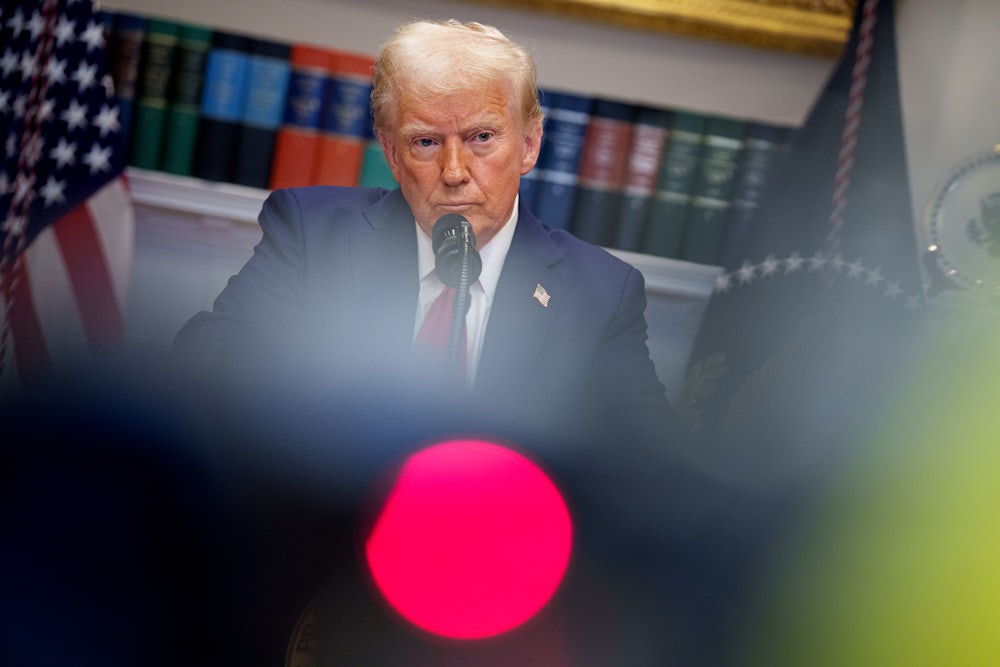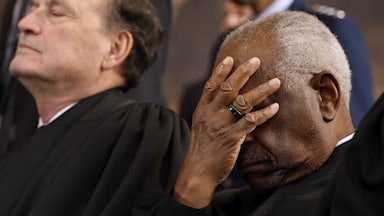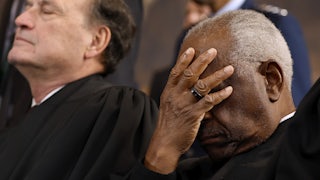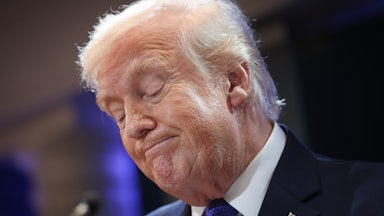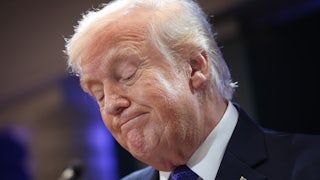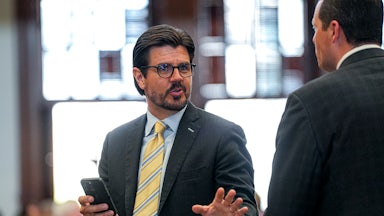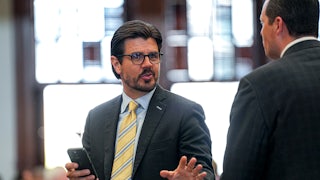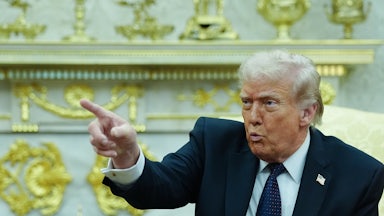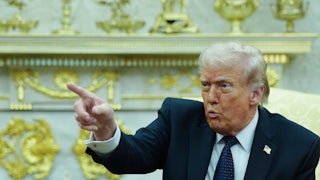In 2017, President Donald Trump insisted that his power to pardon was “complete”—a claim consistent with his generally absolutist views of the office’s powers, and one also inherited from his predecessors. “The President, in his action on pardon cases, is not subject to the control or supervision of anyone,” said President Woodrow Wilson’s attorney general. President Dwight Eisenhower’s pardon attorney claimed that in exercising the power, “the President is amenable only to the dictates of his own conscience.” President Bill Clinton’s pardon attorney advised that any cooperation with congressional investigators on pardon matters was entirely voluntary.
The pardon power is expansive, and also now a near-weekly tool to reward Trump’s political allies. But just last week, a federal court punctured the popular idea that the power is somehow immune to a normal constitutional check.
Among the recipients of Trump’s January 6 pardons was John Sullivan, who turned a profit from selling video footage from the riot—money the government later seized. Sullivan claimed, with the backing of the Justice Department, that the government must now reimburse him. Pardons are supposed to relieve a recipient from punishment, and so Sullivan argued that repayment should be a part of that promise. But the court ruled against him, concluding that “funds may not be drawn from the Treasury without an appropriation, plain and simple.” That is, any repayment would run through Congress, which decides how money is dispensed.
The case is nominally about whether a pardonee gets to reclaim seized property. But it is more fundamentally about the separation of powers. The president is vested with the power to pardon, while Congress is vested with the power to spend money. Sullivan received his pardon, but “money is money, the Treasury is the Treasury, and the Constitution says what it says: Once money is in the Treasury, it can only be withdrawn pursuant to a Congressional appropriation,” wrote the Reagan-appointed judge.
This was not the first time this particular issue landed in court; the last time, interestingly enough, was after another insurrection. In 1868, President Andrew Johnson pardoned hundreds of thousands of former Confederates, including Herman Knote, whose property the federal government confiscated and sold during the Civil War. After receiving his pardon, Knote sued to claim the proceeds from the government’s sale of his property, claiming, like Sullivan, that the pardon entitled him to the money.
The Supreme Court disagreed. In Knote v. United States, the court held that while clemency lifts the punishment for a crime, the pardon power cannot simultaneously undermine other parts of the Constitution—in this case, again, Congress’s power of the purse. “Whilst a full pardon releases the offender from all disabilities imposed by the offense pardoned,” the funds from the property sale had already been deposited into the Treasury. And unfortunately for Mr. Knote, once there, they “can only be withdrawn by an appropriation by law.”
When the pardon power bumped up against another part of the Constitution, the former was not entitled to run roughshod over the latter. “However large, therefore, may be the power of pardon possessed by the President,” the court added, “and however extended may be its application, there is this limit to it, as there is to all his powers.” Presidents have nonetheless continued to claim that the pardon power is a kinglike exception to the rule; federal courts have also continued, in case after case, to remind them that they are wrong.
In 1915, for instance, the Supreme Court found that President Wilson could not cleverly pardon a newspaper editor as a means of compelling his testimony to a grand jury by abrogating his right to remain silent under the Fifth Amendment. The court held “that the power of the President under the Constitution to grant pardons and the right of a witness must be kept in accommodation.” In 1974, the court held that a president’s clemency powers include the authority to impose conditions on a commutation, provided those conditions do not violate other constitutional provisions. The exercise of the pardon power, said the court, cannot “offend the Constitution.”
In other cases this year, the Justice Department has argued that Trump’s January 6 pardons somehow cover criminal offenses unrelated to January 6. Courts, in response, have mostly balked. Last month, prosecutors moved to dismiss the gun possession conviction of an alleged drug dealer by claiming that the pardon covered the offense because it was discovered during a January 6–related investigation. A district court denied the motion (a “bad faith” and “unreasonable” one, it added). The defendant’s lawyer also argued that “courts don’t have the authority to interpret a pardon,” while prosecutors said courts should defer to the executive branch’s own interpretation—challenging not just the potential check itself, but the authority to exercise a check in the first place. Again last month, a federal appellate court reasserted its constitutional authority to review the scope of a pardon, and struck down the Department’s attempt to inappropriately apply it to separate crimes.
Courts are playing their part. But as with the current administration’s general assault on the rule of law, and despite insisting on their role in performing a constitutional check, courts alone are not going to rein in escalating abuses.
Ever since President Richard Nixon dangled pardons to his Watergate henchmen, presidents have used the pardon power to self-deal—granting clemency to friends and family members and donors, and to obstruct investigations and reward loyalty. But nothing has come close to President Trump’s abuse of the power. As a Washington Post investigation of all clemency acts during his first term concluded: “Never before had a president used his constitutional clemency powers to free or forgive so many people who could be useful to his future political efforts.” His second term appears no different. By one recent estimate, Trump has wiped out more than 700 years of prison time for his allies and supporters since retaking office.
To make matters worse, while pardons can be used to commit certain crimes, like to bribe or obstruct justice, the Supreme Court issued an opinion last year that effectively immunizes a president’s “official acts” from criminal liability, including pardons. In recent months, a lucrative cottage industry of “pardon shopping” has formed, with pardon seekers paying big to lobby the president’s inner circle, according to The Wall Street Journal. The court’s ruling now helps to insulate a president from criminal accountability—say, if it were discovered that a pardon functioned as a bribe.
Yet the ruling does not insulate a president from congressional oversight. Both Democratic and Republican members of Congress have voiced alarm in recent months at expanding abuses—Democrats criticizing President Joe Biden’s pardons of family members and Republicans denouncing Trump’s January 6 pardons. They include Democratic Senator Adam Schiff, a longtime pardon reform champion, but also Republican Senator Lindsey Graham, who suggested that Congress “revisit” the scope of the power. Bipartisan majorities of Americans also support clearer limits.
There are two branches responsible for checking executive power, not one. A basic role for lawmakers could start with an investigation of pardon practices by recent administrations of both parties. This may seem far-fetched for our currently languishing legislature, but consider congressional hearings that examine the Hunter Biden pardon alongside Roger Stone’s. The exercise has bipartisan precedent: from Ford to Clinton, Republicans and Democrats have jointly investigated pardon abuses. A step further, Congress could work toward what’s known as a “sense of Congress resolution”—a kind of joint statement of principles—to clarify the constitutional meaning of clemency. Resolutions are not law, but they can be important reassertions of political norms. Congress could also create new tools, such as passing legislation to specifically sharpen its pardon oversight tools, or even initiate discussion of a constitutional amendment.
All of this is dependent upon a basic recognition that the pardon power is less invincible than many presidents would have us believe. Repeating the fanciful claim of an unchallengeable power does not make it so. What courts are offering is not just a constitutional check, but also a reminder that constitutional checks on the pardon power are well within the realm of the possible.
